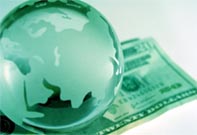Vietnam unable to sell bonds to finance deficit
 Hanoi - Vietnam will have to offer higher interest rates if it expects to sell enough government bonds to finance its budget deficit, economic experts said Monday.
Hanoi - Vietnam will have to offer higher interest rates if it expects to sell enough government bonds to finance its budget deficit, economic experts said Monday.
The government expects its budget deficit to jump to 5.9 billion dollars this year, to be financed in part by 3.1 billion dollars in new bonds. But the global financial crisis is scaring investors away from emerging markets, meaning Vietnam will have to offer high interest rates.
On Thursday Vietnam's State Treasury tried to sell 1 trillion dong (52.7 million dollars) in two- and three-year bonds at yields of 7.2 to 7.3 per cent, but found no takers. Buyers demanded yields of 8.5 to 9.2 per cent.
"If the government offered a higher interest rate, investors would be ready to buy," said Le Dang Doanh, former head of the Central Economic Management Research Institute.
Besides the dong-denominated bonds, the government last week said it planned to sell 300 million dollars in US dollar-denominated bonds this month.
Vu Thanh Tu Anh, research director at the Fulbright Economic Teaching Program in Ho Chi Minh City, was skeptical about the proposed sale.
Anh said the government was limiting interest payments on dollar-denominated bank accounts to 3 per cent in order to reduce dollarization of the economy. If it offers higher interest on the dollar-denominated bonds, that could increase demand for dollars and drive the black-market exchange rate for the Vietnamese dong down.
But if the interest rate is too low, buyers will not be interested.
"There is not much space for the government to maneuver in this case," Anh said.
The rise in the government budget deficit is due to falling income from crude oil and other exports, as well as a 1-billion-dollar stimulus plan to spur demand in the economy.
Ultimately, Anh said, the failed bond sales could affect the credibility of the government.
"Investors do not dare to take risks as they used to," said Anh. "They have moved to a more conservative and defensive manner."
Adam McCarty, head of Mekong Economics in Hanoi, said the government might not be able to raise enough cash to finance its budget. He recommended scaling back large-scale investments in state-owned projects such as new oil refineries until the international investment climate eases.
In the meantime, anxiety over emerging-market investments means that if Vietnam wants to spend now, it will have to offer premium interest rates.
"Everybody's dived into secure assets, and secure assets are in developed countries," said economist Adam McCarty of Mekong Economics in Hanoi. "In this environment, if you want people to put money into Vietnam, you have to make it attractive, and that means expensive for Vietnam." (dpa)